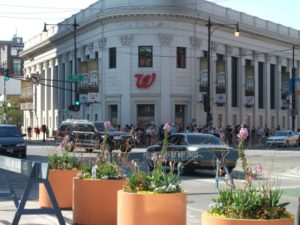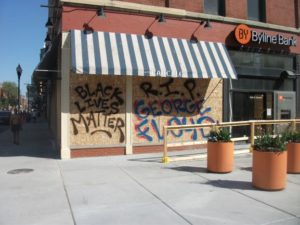 I weep for my neighborhood. I weep for Chicago.
I weep for my neighborhood. I weep for Chicago.
I weep for the state of criminal justice in America when a police officer, hand in his pocket, a look of utter indifference on his face, feels the sense of impunity that empowers him to kneel on a black man’s neck in broad daylight for more than eight minutes until he dies.
I cheer for America’s resilient sense of justice when bystanders train their cell phone cameras on this officer and refuse to back down in documenting injustice while they plead for the man’s life.
These mixed feelings have haunted me for more than a week now, as events have evolved across the nation. I am glad that the state of Minnesota has arrested and charged officer Derek Chauvin for murder, not out of a desire for revenge but because justice demands it. The sense of impunity that allowed him to ignore bystanders’ pleas to remove his knee from George Floyd’s neck must be the first casualty in this crisis. Serious police department reform is a necessity. As I write this, Minnesota Attorney General Keith Ellison has announced that the other three officers at the scene have been charged with aiding and abetting the crime.
But America also faces some serious lessons in civic leadership, from top to bottom. At the White House, for at least a few more months, we are stuck with a president who, facing the second major crisis of his final year in office after failing to prepare for or respond effectively to a pandemic, now is fanning the flames of hatred while throwing matches on the fire. Emerging from his protective bunker in the White House, he used National Park Service police to clear his path of peaceful protesters for the mere purpose of standing in front of St. John’s Episcopal Church, without invitation or permission to use it as a camera prop, to hold a Bible high while threatening violence against protesters and insulting the governors and mayors who have done the real hard work to bring calm to their communities. It is thankless work, lie-awake-at-night work, very unlike the simple-minded task of tweeting empty threats to violate the Constitution. Most presidents, while asserting their proper authority, have sought to unite the country. Trump prefers to drive a wedge with the help of a Bible he does not understand and seldom if ever reads.
Amidst this dearth of national leadership, there is a shortage of leadership on the streets that reflects both deep anger and a failure of our society to create a sense that everyone has a stake in the success and prosperity of our communities. And, to be sure, there are criminal elements that are only too happy to take advantage of these gaps in equity and leadership. That is where we find ourselves now, today, this week, this summer, this year, while still seeking to recover economically, medically, and emotionally from the toll of a coronavirus pandemic whose toll in America now exceeds 100,000 lives, and counting.
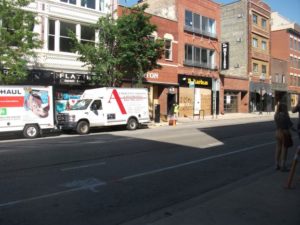 As most readers of this blog know, I live in Chicago. Over the weekend and into Monday evening, at bedtime, I could hear the sirens and fire trucks and helicopters in the distance and know that not all was well. I could see on local television channels the coverage of looting that damaged familiar areas of the city, as well as protests against police brutality. But I had not left the house, for a variety of reasons. However, it became clear that Wicker Park, an area less than a mile from us, was struck by looters Sunday evening, leaving windows smashed and property damaged. Small business owners have been waiting patiently, amid considerable financial angst, for the promised partial reopening from the pandemic on June 3, a few days after many state restrictions were lifted on May 29. And then this.
As most readers of this blog know, I live in Chicago. Over the weekend and into Monday evening, at bedtime, I could hear the sirens and fire trucks and helicopters in the distance and know that not all was well. I could see on local television channels the coverage of looting that damaged familiar areas of the city, as well as protests against police brutality. But I had not left the house, for a variety of reasons. However, it became clear that Wicker Park, an area less than a mile from us, was struck by looters Sunday evening, leaving windows smashed and property damaged. Small business owners have been waiting patiently, amid considerable financial angst, for the promised partial reopening from the pandemic on June 3, a few days after many state restrictions were lifted on May 29. And then this.
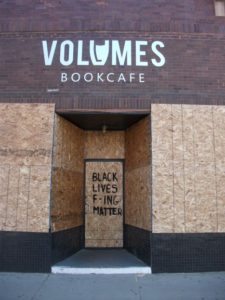 On Tuesday, after both a telemedicine meeting at 2 p.m., following up on my recent hospitalization, and a team meeting for a planning consulting proposal at 3 p.m., I decided it was time to find out what had happened. I walked down North Avenue to the six-way corner of North, Damen, and Milwaukee, the nerve center of Wicker Park, an area that gentrified in the 1980s and 1990s but retains an artsy demeanor, with independent bookshops, cafes, and art stores. I chose not to drive or even bicycle because being on foot seemed to me the best way to absorb a full sense of our tragedy and dilemma, even though I knew Wicker Park was far from being the most hard-hit area in the city. Those questionable labels belong to the downtown, temporarily cordoned off to all but essential workers, with many Chicago River bridges raised to prevent access, and to the South and West Sides, predominantly black areas where the torching of stores often exacerbated the food desert that had only recently been ameliorated with the opening of new grocery stores. One owner of Subway shops saw all six of his stores on the South Side destroyed.
On Tuesday, after both a telemedicine meeting at 2 p.m., following up on my recent hospitalization, and a team meeting for a planning consulting proposal at 3 p.m., I decided it was time to find out what had happened. I walked down North Avenue to the six-way corner of North, Damen, and Milwaukee, the nerve center of Wicker Park, an area that gentrified in the 1980s and 1990s but retains an artsy demeanor, with independent bookshops, cafes, and art stores. I chose not to drive or even bicycle because being on foot seemed to me the best way to absorb a full sense of our tragedy and dilemma, even though I knew Wicker Park was far from being the most hard-hit area in the city. Those questionable labels belong to the downtown, temporarily cordoned off to all but essential workers, with many Chicago River bridges raised to prevent access, and to the South and West Sides, predominantly black areas where the torching of stores often exacerbated the food desert that had only recently been ameliorated with the opening of new grocery stores. One owner of Subway shops saw all six of his stores on the South Side destroyed.
The urologist with whom I spoke during the 2 p.m. appointment had recently moved to a high-rise near his downtown office in the Northwestern Memorial Hospital complex. I asked him about the situation. “It’s terrible,” he said flatly, then noted that he had walked down Michigan Avenue, and “it felt like Detroit.” Anyone who has spent time on the usually vibrant Magnificent Mile until recently knows what a stunning statement that is. Buildings are boarded up, many were looted, some were torched. At a recent mayoral press conference, the city buildings commissioner noted that her department was reaching out to the owners of at least 180 damaged buildings citywide to provide support for rebuilding. It may go without saying, but the damage harms not only the business owners, but employees who had fervently been hoping to return to work, many of them black, Latino, or Asian.
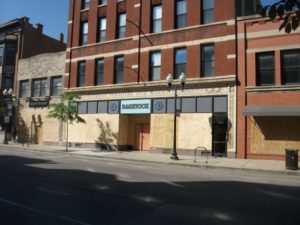 The walk down North Avenue was more routine than jarring, interrupted only by pedestrians passing in the opposite direction, some with dogs on leashes, some wearing masks, some not. It was at the six-way intersection that I began to see the impact of the past weekend. As I made the wide-right turn onto Milwaukee Avenue, it became clear that perhaps 80 percent of the businesses in the next half-mile southward toward Division St. were boarded up. Many businesses may have done so proactively, seeing the damage to others and wanting to avoid a similar fate on a subsequent night. Others, like Ragstock, had been attacked over the weekend, with windows smashed, merchandise stolen or destroyed, and equipment ransacked. It was hard to tell which was which, but the overall effect was that of significant lost opportunity and delayed reopening of a vital commercial district on Chicago’s North Side. For those that had been attacked and looted, the work of restoration could easily delay reopening by weeks.
The walk down North Avenue was more routine than jarring, interrupted only by pedestrians passing in the opposite direction, some with dogs on leashes, some wearing masks, some not. It was at the six-way intersection that I began to see the impact of the past weekend. As I made the wide-right turn onto Milwaukee Avenue, it became clear that perhaps 80 percent of the businesses in the next half-mile southward toward Division St. were boarded up. Many businesses may have done so proactively, seeing the damage to others and wanting to avoid a similar fate on a subsequent night. Others, like Ragstock, had been attacked over the weekend, with windows smashed, merchandise stolen or destroyed, and equipment ransacked. It was hard to tell which was which, but the overall effect was that of significant lost opportunity and delayed reopening of a vital commercial district on Chicago’s North Side. For those that had been attacked and looted, the work of restoration could easily delay reopening by weeks.
Nonetheless, Chicago Mayor Lori Lightfoot, who toured the affected areas on Tuesday (June 2), reported that the overwhelming reaction of business owners when she asked about possible delays in reopening was to encourage her to move forward, which she is now doing. Not everyone is pleased because of the induced inequality of opportunity, with consequent job losses and lost incomes, due to the damages that were inflicted. The only way forward is to assist with cleanup and rebuilding, not to put everything on hold.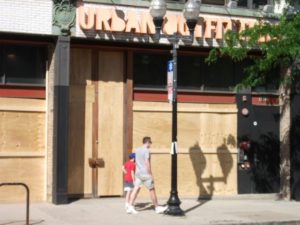
Nor would everyone be pleased with my focus on this question. There are many who would argue that the rioting is an expression of frustration and powerlessness, and for some, I am sure, that is true. As Chicago Tribune columnist Clarence Page notes, Rev. Dr. Martin Luther King, Jr., in his 1967 book, Where Do We Go from Here: Chaos or Community?, explained riots in the 1960s by saying, “A riot is the language of the unheard.” He was not condoning such activity but trying to impress upon white Americans that racial justice cannot forever be denied or delayed without serious social consequences.
But it is important to raise the issue of how the protests against police violence can and did, in some cases, go awry. One factor is the pent-up frustration of which King wrote. Another is the deliberate attempts by those of ill will to take advantage of unrest to advance their own purposes, which may be criminal or manipulative. The latter category would include all manner of provocative agents either seeking to undermine the protests by discrediting them or by bending and twisting them to the will of extremists who would not easily carry the day in an open, democratic discussion of protest goals.
It has never been hard to find examples of either motive. At 70, I am a veteran of the 1960s and 1970s who has joined his own fair share of marches for the environment, to oppose war, or for civil rights. I can easily remember learning, in my college years, how to identify agents provocateurs of any political stripe who would seek opportunities to redirect a discussion or a protest toward unfortunate ends. And I also know that it was the spiritual strength of leaders like King, or Nelson Mandela, or Mohandas Gandhi that helped to maintain a discipline of purpose in countless demonstrations and protests around the world. Gandhi used the Hindi word “satyagraha,” meaning “spirit power,” which he said gave otherwise beaten-down people a sense of self-respect, purpose, and moral strength. Christians may find such solace in the Holy Spirit, but the concept has its own universality.
Why do I raise this issue? Because, clearly, we need a way to move beyond the stigma of riots and looting to maintain the dignity of the cause for which George Floyd’s needless death has become a catalyst. We need a way to channel the power of the protests to make the provocateurs and the criminals unwelcome, and to harness the anger of those wayward souls easily led astray. That requires the sense of purpose that spirit power unleashes in making leaders of those who have felt left behind. It requires instilling vision.
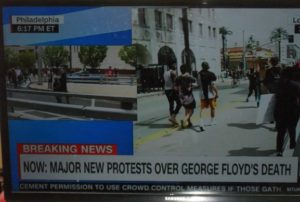 Make no mistake. I am proud of the political leadership provided at this time in Illinois by both Gov. J.B. Pritzker and Mayor Lightfoot, as well as many others in lesser posts, as well as some mayors and governors elsewhere. But the leadership needed to save and redirect the protests will not come from politicians. It will come from neighborhood leaders like Jahmal Cole, with the sense of humility that comes of building movements from the ground up, and thus understanding how to reach and relate to people where it matters. Cole spoke at Mayor Lightfoot’s press conference last Sunday (May 31), along with clergy and other civic leaders, but his impassioned speech reappeared on the op-ed page of the Chicago Tribune two days later, under the headline, “Looting isn’t the answer, but organizing is.” He distinguishes between mobilizing people and organizing them, making the powerful case that organizing is the true hard work, with fundamentals, or basic rules. Leadership does not just happen. It is trained, but it also grows organically from heart-felt commitment.
Make no mistake. I am proud of the political leadership provided at this time in Illinois by both Gov. J.B. Pritzker and Mayor Lightfoot, as well as many others in lesser posts, as well as some mayors and governors elsewhere. But the leadership needed to save and redirect the protests will not come from politicians. It will come from neighborhood leaders like Jahmal Cole, with the sense of humility that comes of building movements from the ground up, and thus understanding how to reach and relate to people where it matters. Cole spoke at Mayor Lightfoot’s press conference last Sunday (May 31), along with clergy and other civic leaders, but his impassioned speech reappeared on the op-ed page of the Chicago Tribune two days later, under the headline, “Looting isn’t the answer, but organizing is.” He distinguishes between mobilizing people and organizing them, making the powerful case that organizing is the true hard work, with fundamentals, or basic rules. Leadership does not just happen. It is trained, but it also grows organically from heart-felt commitment.
Cole closes with a “message to the cops,” stating that a badge “gives you a platform that will elevate your true character.” It will either amplify your wickedness or amplify your platform to do good. Perhaps it can be said that, in a much less formal way, joining a movement can do the same. Every protester faces a moral choice. We need leaders who redirect wayward energy and identify and exclude evil intent. They will not succeed in every instance. Many instances of crime and looting will be out of their control and depend far more on police response and readiness. But their efforts will nonetheless help our nation reframe the debate over racial injustice.
Jim Schwab

